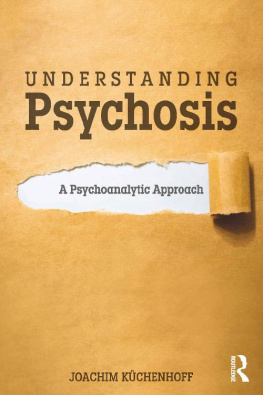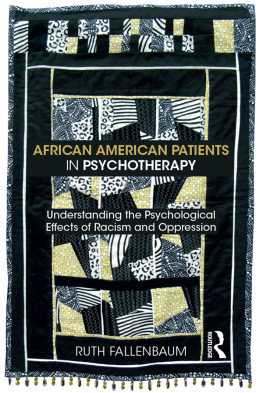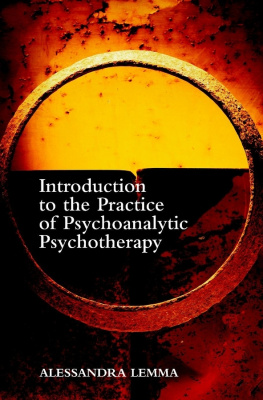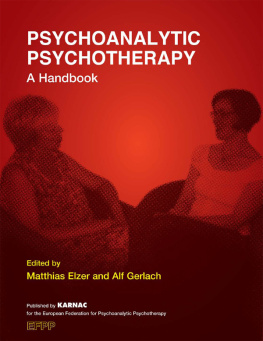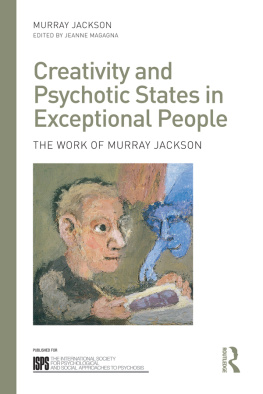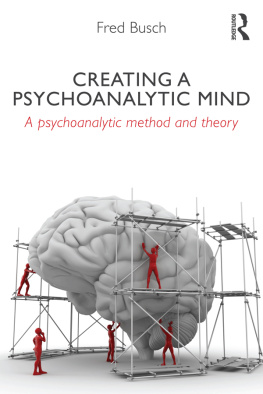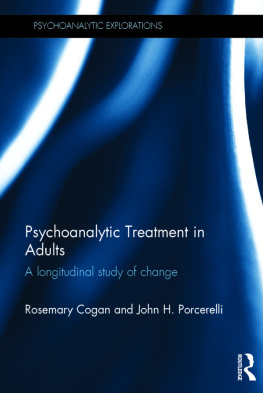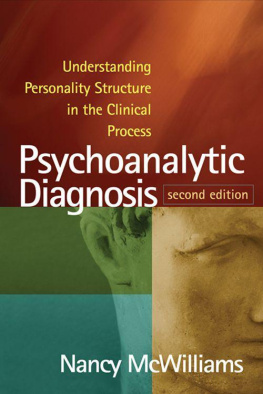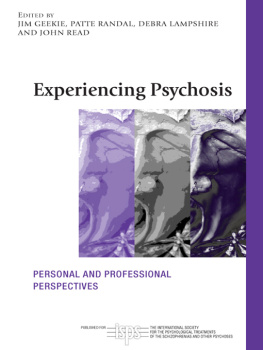
Understanding Psychosis
Do psychotic disorders make sense? Are psychotic symptoms amenable tointerpretation? Understanding Psychosis: A Psychoanalytic Approach takes thevarious pathways to psychotic illness outlined by psychoanalytic clinicians andscholars and integrates them into a model that allows a systematic assessment ofrelevant psychodynamic dimensions in the diagnosis of psychotic disorders, andwhich serves as a guide to psychotherapy with psychotically ill patients.
Joachim Kchenhoff reviews and integrates various psychoanalytic conceptsand theories about psychosis into a multi-dimensional psychodynamic model thatallows an assessment and understanding of the patients subjective experience,objective psychological capabilities, and interpersonal resources. Kchenhoffhelps the therapist to establish a basic attitude in working psychodynamicallywith patients and to understand the dynamics of the therapeutic relationship.Understanding Psychosis also addresses specific issues that can arise in work withclients experiencing psychosis, including understanding imminent crises orprecursor states, elucidating semiotic qualities in seemingly negative symptoms,differentiating the psychotic and a non-psychotic part of the personality andproviding a dynamic approach to the psychopharmacological treatment. Clinicalvignettes and three detailed case reports are included in the book.
Understanding Psychosis will be an essential guide for psychiatrists, psychotherapistsand psychoanalysts working with patients experiencing psychosis. Itwill also be of use to psychologists, and academics and students of psychotherapy,psychiatry and psychoanalysis for psychosis.
Joachim Kchenhoff, MD, is a psychoanalyst and member of the IPA and of theSwiss and German psychoanalytic societies. He is a specialist in psychiatry,psychotherapy and psychosomatic medicine, and is Professor of Psychiatry andPsychotherapy at the University of Basel, Switzerland. He has been workingas the medical director of the department of adult psychiatry in Baselland,Switzerland, since 2007. He is editor-in-chief of the SANP (Swiss Archives ofNeurology, Psychiatry and Psychotherapy), president of the supervisory board atIPU (International Psychoanalytic University) Berlin and member of many otheradvisory boards. He is author and editor of many previous publications.
Understanding Psychosis
A Psychoanalytic Approach
Joachim Kchenhoff
Translated by M. A. Luitgard Feiks and Jrgen Muck
First published in English 2018
by Routledge
2 Park Square, Milton Park, Abingdon, Oxon OX14 4RN
and by Routledge
711 Third Avenue, New York, NY 10017
Routledge is an imprint of the Taylor & Francis Group, an informa business
2018 Joachim Kchenhoff
The right of Joachim Kchenhoff to be identified as author of this work has been asserted by him in accordance with sections 77 and 78 of the Copyright, Designs and Patents Act 1988.
All rights reserved. No part of this book may be reprinted or reproduced or utilised in any form or by any electronic, mechanical, or other means, now known or hereafter invented, including photocopying and recording, or in any information storage or retrieval system, without permission in writing from the publishers.
This work is a translation of a work previously published in German as: Joachim Kchenhoff: Psychose
Psychosozial-Verlag, Gieen, 2012, www.psychosozial-verlag.de
Translated by M.A. Luitgard Feiks and Jrgen Muck
This translation was financially supported by Psychiatrie Baselland (Psychiatric Centre, Basel, Switzerland)
Trademark notice: Product or corporate names may be trademarks or registered trademarks, and are used only for identification and explanation without intent to infringe.
British Library Cataloguing in Publication Data
A catalogue record for this book is available from the British Library
Library of Congress Cataloging in Publication Data
Names: Kchenhoff, Joachim, author.
Title: Understanding psychosis : a psychoanalytic approach / Joachim
Kchenhoff; translated by M.A. Luitgard Feiks and Jrgen Muck.
Other titles: Psychose. English
Description: Milton Park, Abingdon, Oxon; New York, NY : Routledge,
2018. | Includes bibliographical references.
Identifiers: LCCN 2018013567 (print) | LCCN 2018014233 (ebook) |
ISBN 9781351025942 (Master e-book) | ISBN 9781138494664 (hbk) |
ISBN 9781138494671 (pbk) | ISBN 9781351025942 (ebk)
Subjects: LCSH: PsychosesCase studies. | PsychoanalysisCase studies.
Classification: LCC RC512 (ebook) | LCC RC512.K8313 2018 (print) |
DDC 616.89/17dc23
LC record available at https://lccn.loc.gov/2018013567
ISBN: 978-1-138-49466-4 (hbk)
ISBN: 978-1-138-49467-1 (pbk)
ISBN: 978-1-351-02594-2 (ebk)
Typeset in Times New Roman
by Keystroke, Neville Lodge, Tettenhall, Wolverhampton
Contents
If as actually occurred in 2011 a 32-year-old man, after several years of meticulous planning and preparation, carries out a horrendous mass murder, and subsequently, although to at least some degree fully cognisant of his wrongdoings, claims it to be a courageous and heroic act of protest and resistance against the proliferation of socialism and Islam, and against contemporary society in general, then the question arises (and it is a pressing one) whether we are on the right track if we believe that we can judge this mans extreme and outrageous way of thinking and acting by the same psychological standards or criteria as are required when it comes to interacting with more or less ordinary people. And if, on top of it, the perpetrator claims membership to an order he calls the New Knights Templars and, as it were, to other forms of medieval brotherhoods or old-boy networks, thus insisting that he belongs to an organisation or movement that does not exist any longer, then the question forces itself upon us, if this mans thinking is not indeed to be viewed as highly delusional.
Seeking for a psychotic explanation or motivation for such a shocking and dreadful deed does actually serve one purpose and perhaps one purpose only: to pacify and calm peoples destabilised minds in the face of such inconceivable horror. Just as the legal system provides for the mentally ill person the legal basis for the exemption of total or partial responsibility, it is also the case that for most people directly or indirectly affected by the mass killing, the diagnosis of a mental illness of the mass murderer would tend to have a mitigating effect. And so it is safe to say that the diagnosis of a psychotic illness at times may play an important regulating function that re-establishes the disrupted or lost order and the almost completely extinguished sense of hope and security, caused by the gravity of the offence committed, which lies so far beyond the scope of comprehension that one could justifiably say that the world has been turned upside down. Hence, it appears to be this imagination of it being simply and exclusively due to the murderous impulses of one single persons severely disturbed and ill mind capable of a deed which unhinged the world that will finally help people to regain their former sense of serenity and peace of mind.
If a poet like Friedrich Hlderlin, who proves to be not only a revolutionary and radical theoretical thinker, but who over and above that in his use of the German language pushes beyond the traditional boundaries of expression, at a certain point in his life loses his ability to cope with day-to-day life and, as a corollary of that, has to be provided with medical treatment, special care and assistance, because his emotional and mental torment at a certain point in time became so excessive and overwhelming that he was diagnosed as psychotic, then this kind of diagnosis automatically impeaches the poets credibility and casts doubt on his poetic skills. His entire work, his ideas and his language performance with its specific linguistic expressiveness are now being put under scrutiny and analysed, exclusively with a view to detect and discover the first and clandestine signs of a severe oncom-ing mental illness. The admirers of the poet consider this psychiatric assessment simply as a disgrace, as if this casts a slur on the poets sublime spirit; they come up with all sorts of explanations and ideas in order to negate and ignore his personal suffering and instead prefer to view his idiosyncrasies as a wilful performance or even an act of political wisdom. And then there are those who, on the other hand, never were favourably inclined towards the poet and his work, and on whom his poems had always exerted a more or less disturbing and unsettling effect, and who now with this psychiatric diagnosis have a hit on their hands, which finally allows them to debunk his ideas and beliefs and to expose the great-ness of his poetic work as a myth, and even to discount and dismiss it as the ramblings of a deeply disturbed and troubled mind (Gonther and Schlimme 2011).
Next page
